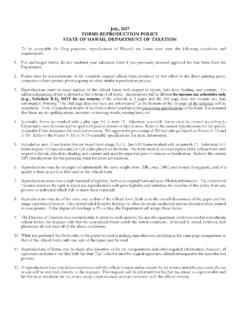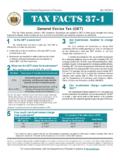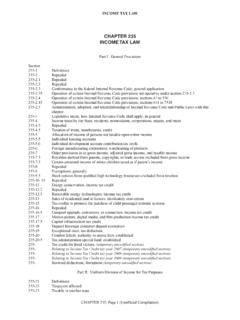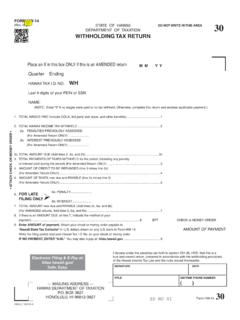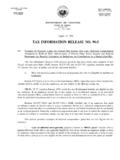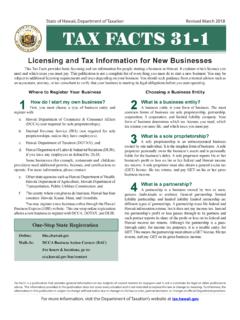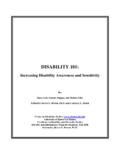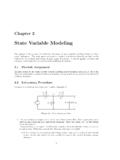Transcription of TAX INFORMATION RELEASE NO. 2016-02 - …
1 DAVID Y. IGE GOVERNOR SHAN TSUTSUI LT. GOVERNOR STATE OF HAWAII DEPARTMENT OF TAXATION BOX 259 HONOLULU, HAWAII 96809 PHONE NO: (808) 587-1540 FAX NO: (808) 587-1560 MARIA E. ZIELINSKI DIRECTOR OF TAXATION JOSEPH K. KIM DEPUTY DIRECTOR May 26, 2016 TAX INFORMATION RELEASE NO. 2016 -02 RE: Voluntary Disclosure Practice The purpose of this Tax INFORMATION RELEASE (TIR) is to provide INFORMATION about and establish procedures for the voluntary disclosure process. The Department of Taxation (Department) maintains a voluntary disclosure process as an informal practice allowing taxpayers to voluntarily disclose any liability for all Hawaii taxes including general excise tax, transient accommodations tax, corporate net income tax, and individual net income tax. This TIR supersedes TIR No. 2010-07. Among Hawaii s various taxes, the general excise tax (GET) is perhaps the most often misunderstood by out-of-state taxpayers because of its superficial similarity to a typical sales tax.
2 The GET is a broad based business privilege tax that casts a wide and tight net and applies to virtually every economic activity The Hawaii Supreme Court, in vs. Director of Taxation, 135 Haw. 88, 346 157 (2015) (Travelocity), affirmed that Hawaii s GET extends to gross income derived from engaging in business2 in Hawaii even if a taxpayer has little or no physical presence in Hawaii. Specifically, the court in Travelocity determined that on-line travel companies were doing business in Hawaii for purposes of GET even though their primary business functions were performed outside of Hawaii. Taxpayers must consider their potential tax liabilities given the broad scope of the GET and Hawaii s other taxes. Voluntary disclosure is an option for taxpayers with outstanding Hawaii tax liabilities. Voluntary disclosure allows taxpayers to preemptively reveal any tax liabilities to the Department. In return, the taxpayer may avoid criminal tax investigation, and a civil audit, assessment, and collection.
3 In addition, the Department may waive penalties and some interest. Ultimately, by coming forward voluntarily the taxpayer may avoid criminal tax investigation and time and costs associated with audit, assessment, collection, and litigation. WHAT CONSTITUTES A VOLUNTARY DISCLOSURE? A voluntary disclosure will be considered as such when a taxpayer fully cooperates with the Department in determining the taxpayer s Hawaii tax liability. All circumstances relevant to Hawaii tax law must be disclosed. All communications and disclosures must be truthful, accurate, and complete. Any misrepresentation by the taxpayer will cease further consideration of the disclosure. Final acceptance of any voluntary disclosure is at the Department's discretion. 1 In re: Island Holidays, Ltd. 59 Haw. 307, 316 (1978), Pratt v. Kondo, 53 Haw. 436, 436 (1972). 2 Section 237-2, Hawaii Revised Statutes, defines Business and engaging in business as including all activities (personal, professional, or corporate), engaged in or caused to be engaged in with the object of gain or economic benefit either direct or indirect, but does not include casual sales.
4 The term engaging as used in this chapter with reference to engaging or continuing in business also includes the exercise of corporate or franchise powers. Tax INFORMATION RELEASE No. 2016 -02 May 25, 2016 Page 2 of 4 WHO IS NOT ELIGIBLE FOR VOLUNTARY DISCLOSURE? Taxpayers who have been contacted by the Department prior to initiating the voluntary disclosure process or who are under Federal or State audit or criminal investigation are not eligible. To ensure a taxpayer is eligible, the Department will verify that a taxpayer is not under audit or criminal investigation and has not been previously contacted by the Department. In addition, taxpayers who have participated in the Department's voluntary disclosure process during the previous five years are ineligible. Note that anonymity prevents the voluntary disclosure process from being initiated. Therefore, if an audit is initiated on a taxpayer who has anonymously contacted the Department regarding voluntary disclosure, that taxpayer no longer qualifies for the voluntary disclosure program.
5 WHAT IF I AM NOT ELIGIBLE FOR VOLUNTARY DISCLOSURE? If a taxpayer is not eligible for voluntary disclosure or if the Department otherwise decides not to accept the taxpayer, the taxpayer should still come forward and become current with its reporting requirements. WHAT IS THE DEPARTMENT'S LOOK-BACK PERIOD? The Department's look-back period is ten years and in most cases the look-back period will be limited to ten years. However, in certain situations the Department may look back more than ten years, for example a taxpayer's questionable conduct or business practices may be reasons for the Department to look back beyond ten years. The Department will consider all relevant facts and circumstances on a case-by-case basis regarding the look-back period. For those filing through the Multistate Tax Commission Voluntary Disclosure Program, the Department will honor their agreement. DO I HAVE TO FILE TAX RETURNS? Yes. The taxpayer will be required to file the appropriate tax returns for all years subject to the voluntary disclosure.
6 Worksheets or summaries are not acceptable in lieu of filing the appropriate tax returns. DO I HAVE TO PAY PENALTIES & INTEREST? It depends. The Department has the discretion to waive penalties and some interest in most cases of full cooperation and disclosure by the taxpayer. The Department's decision to waive penalties and some interest is made on a case-by-case basis and upon all the facts and circumstances and there is no guarantee that the Department will do so and voluntary disclosure creates no right to such a waiver. DOES VOLUNTARY DISCLOSURE COVER ALL TAX TYPES? Yes. The voluntary disclosure process applies to all tax types administered by the Department. Therefore, any voluntary disclosure must include all relevant tax types at the time of disclosure. Tax INFORMATION RELEASE No. 2016 -02 May 25, 2016 Page 3 of 4 WHAT IS THE PROCESS FOR VOLUNTARY DISCLOURE? To participate in the voluntary disclosure process, a taxpayer must submit a voluntary disclosure request to the Department.
7 A voluntary disclosure request must be in writing and include a written statement of facts containing the following: 1. Taxpayer's identity, address, and all contact INFORMATION ; 2. If taxpayer is not an individual, the Form of Entity ( LLC, LLP, C Corp, S Corp, Sole Proprietorship, Partnership, ) 3. A full description of taxpayer s real and personal property and all activities in Hawaii; 4. The date taxpayer started activities in Hawaii; 5. A statement that addresses all applicable Hawaii taxes and an estimate of the amounts owed for these tax types for all outstanding periods; 6. The reason for noncompliance with Hawaii tax law; 7. How and when the noncompliance was discovered; 8. The reasons for coming forward now, including whether taxpayer is seeking a tax clearance certificate; 9. An affidavit that taxpayer will fully cooperate with and disclose all relevant INFORMATION to the Department, that all INFORMATION provided in the statement of facts is truthful, accurate, and complete, and that taxpayer has not been contacted by the Department prior to the voluntary disclosure request; and 10.
8 If waiver of penalties and interest is sought, a request for such waiver along with reasons for why penalties and interest should be waived. If a taxpayer is being represented for the voluntary disclosure process, the N-848 Power of Attorney form should be completed and attached to the statement of facts. The Department will review the request and may follow up with a request for more INFORMATION . If the Department accepts the voluntary disclosure request, the Department will notify the taxpayer of any further conditions and requirements to complete the voluntary disclosure process. Voluntary disclosure begins with the submission of the written statement of facts that contains all pertinent data and facts. Mere contact from an attorney or CPA stating that a client, who wishes to remain anonymous, wants to resolve his or her tax liability does not initiate the voluntary disclosure process. If an audit is initiated on that anonymous taxpayer, before the submission of the written statement of facts, that taxpayer no longer qualifies for the voluntary disclosure program.
9 WHO DO I CONTACT TO MAKE A VOLUNTARY DISCLOSURE? Taxpayers or representatives submitting a voluntary disclosure request should send the request to the following email address: An automatic confirmation email will be sent upon receipt of the request. For general questions about voluntary disclosure call (808) 587-1611. Tax INFORMATION RELEASE No. 2016 -02 May 25, 2016 Page 4 of 4 VOLUNTARY DISCLOSURE AS A PRACTICE, NOT A RIGHT OR POLICY This TIR is merely a statement of the Department's informal practice and does not create any legal, substantive, or procedural right in any taxpayer or representative. Voluntary disclosure is a factor in the Department's consideration of commencing investigation or referring potential taxpayers for prosecution. Also, taxpayers accepted into the voluntary disclosure process are not totally immune from audit or criminal prosecution. Voluntary disclosure does not abrogate the independent authority of the Department of the Attorney General or the Offices of the County Prosecutor to investigate or initiate criminal proceedings related to Hawaii tax crimes.
10 In addition, the treatment of similarly situated taxpayers is not relevant to the voluntary disclosure process. EFFECTIVE IMMEDIATELY This TIR memorializing the informal practices of the Department is effective immediately and supersedes TIR No. 2010-07. MARIA E. ZIELINSKI Director of Taxation
